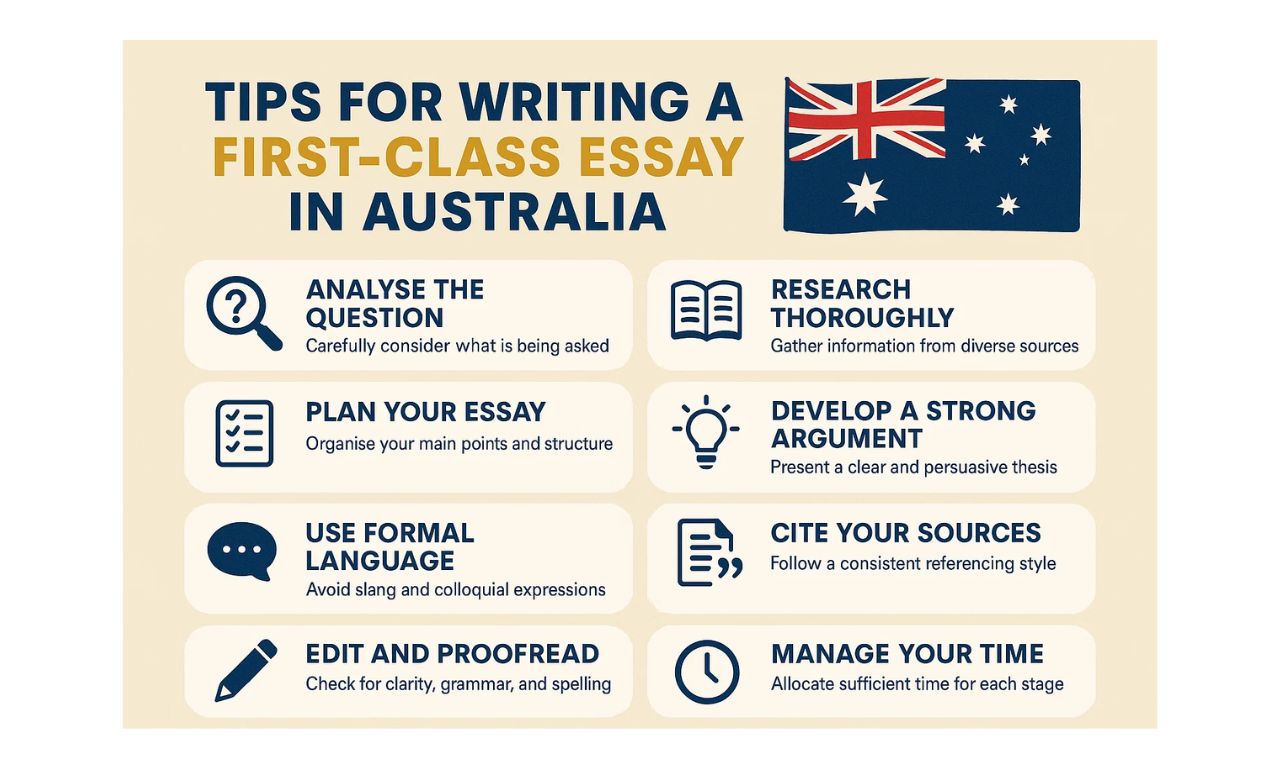When it comes to the academic sectors in Australian universities, the creation of a first-class essay could be considered one of the highest achievements that one can attain. A student, whether at an undergraduate or postgraduate level, should always keep in mind that he or she has to be aware of the specifics that evaluators are seeking and how to successfully address them.
We will be there for you every step of the way to tell you precisely what makes a first-class essay in Australia and we can offer some really helpful hints on how you could plan, write, and goals you could set for yourself that will help you realize what the first-class work really means.
What is a First-Class Essay?
In the Australian system of grading, a top-level essay usually gains a mark of 85% or more. However, the marks in some universities begin from 80% and are considered first-class.
In the context of essay writing, for example, first-class writing may include the following features:
- A deep understanding of the topic
- Critical thinking and original insight
- Comprehensive research and evidence
- Clear structure and logical flow
- Impeccable referencing and academic style
Let’s break down how to achieve each of these.
1. Understand the Question Thoroughly
It is often seen that the students suffer from loss of grades not because of their bad writing, but because of their little understanding of the question.
Tips:
- Enumerate the keywords in the question – watch for directive words in the question such as analyze, discuss, evaluate, compare.
- Determine the scope – recognize what the question tells you what to do and what it doesn’t.
- Divide it into parts – rephrase the prompt in your words and do research or plan writing.
Example:
Essay Question: “Evaluate the impact of globalisation on Indigenous cultures in Australia.”
What it really means: You are required to point out the positive and negative effects of the globalization of the specific on the Indigenous cultural communities of Australia. It is not an essay about globalization in general or about indigenous peoples only.
2. Conduct Smart and Targeted Research
The focus of the Australian universities is the quality of the content, not the number of the references.
Tips:
- Use peer-reviewed journals, books, which are published by reputable publishers, and sources from government entities, educational institutions
- Do the work of identifying your sources right from the start to avoid staying without sources to cite at the last moment.
- Assess the reliability, objectivity, and suitability to your field of study of those sources you plan to use to answer the given essay question.
Tap into JSTOR, Proquest, and Google Scholar that are the university’s electronic databases, and of course, utilize the reading materials of the particular unit—most of the time, they are the best source.
3. Create a Strong, Logical Essay Structure
First-class essays have a clear beginning, middle, and end. Structuring your essay properly makes it easier to read and demonstrates logical thinking.
Standard Essay Structure in Australia:
Introduction
- Brief background/context
- Clearly defined thesis statement
- Roadmap outlining what your essay will cover
Body Paragraphs
Each paragraph should:
- Start with a topic sentence
- Present an argument or point
- Provide evidence or examples
- End with a mini-conclusion that ties it back to your thesis
Conclusion
- Restate your thesis in different words
- Summarise your key arguments
- Reflect on broader implications or suggest areas for future research
4. Develop a Strong Thesis Statement
Your thesis statement is the heart of your essay. It must be specific, arguable, and focused.
Weak thesis:
“Globalisation has both positive and negative impacts.”
Strong thesis:
“While globalisation has created economic opportunities for some Indigenous Australians, it has largely undermined cultural autonomy and exacerbated systemic inequalities.”
Tips:
- Place your thesis near the end of your introduction.
- Refer back to it throughout your essay to stay on track.
5. Demonstrate Critical Thinking
Critical thinking is about going beyond description to include analysis, synthesis, and evaluation. It’s what separates a basic pass from a high distinction.
Ways to show critical thinking:
- Compare multiple viewpoints rather than accepting one source as gospel.
- Question assumptions and explore implications.
- Draw connections between theory and real-world examples.
- Acknowledge limitations or counterarguments to show balanced thinking.
6. Use Academic Language and Tone
The Norms of Australian universities for expressing ideas in essays are formality, objectiveness, and conciseness.
Do’s:
- Make correct usage of specific subject matter lexis.
- Write in the third person (avoid “I” unless personal reflection is required).
- Formulate the sentences that are explicit and do not have unnecessary information.
Don’ts:
- Never use contractions (e.g., use “cannot” instead of “can’t”).
- Avoid using slang and being excessively casual in your language.
- Avoid the use of sweeping generalizations or unsupported claims.
7. Reference Correctly (And Rigorously)
If you fail to mention the origin of sources correctly you will not only find yourself in a situation where you could lose your marks because of that but you also could be the accused of plagiarism.
Tips:
- Be aware of your referencing style (APA, Harvard, MLA, etc.).
- Put the source of the content both in the paragraph and in a bibliography.
- Try out programs like EndNote, Zotero, or citation features in Word and Google Docs to manage and create citations.
Be sure that there is the university’s style guide which if not followed precisely can cause these small formatting errors to lose scores in the strict faculties.
Edit Ruthlessly
Wonderful essays are never written quickly, they are the result of several drafts. The first copy is only a draft for the authors to get the ideas out and the next rounds to make it perfect.
What to check is the following:
- Can the arguments be easily understood and are they logically premised and supported?
- Does each paragraph of the essay logically follow the previous one?
- Are you repeating the same points or phrases in different\/same words?
- You can use an automatic proofreading system to check the document, however, you should not solely depend on that.
Pro tip:
One more helpful thing would be to listen to what you have written because it will allow you to detect any spots that are irrelevant or tangled.
9. Seek Feedback
Have a look at it with someone else to rectify flaws before submission. The recipient could be any of the following:
- A peer or study buddy
- A tutor or lecturer during office hours
- Academic writing support services (most universities have them)
Someone else’s perspective will help you point out the areas that have escaped from your sight and will give strength to your argumentation.
10. Manage Your Time Like a Pro
Most of the students usually write hastily and deliver a mediocre work. Finishing the work earlier will not only reduce stress but will also improve the quality of the work.
What is the suggested time frame for such a long essay as 2000 words?
- Week 1: Understand the topic, start researching
- Week 2: Make an outline and the first draft
- Week 3: Revise, edit and then finalize
Monitor your progress with apps like Trello or Notion, or use the Pomodoro technique to focus on your tasks in short bursts of time.
Final Thoughts
The popular notion that for one to write an A-grade essay help in Australia, they must be the most intelligent person in the room is misleading. It is all about being strategic, thorough, and clear in your communication. The standards are high, yet it is within the reach by taking the right direction, they are not a pie in the sky.
Therefore, the main steps are:
- Get the question of your essay correct once and for all
- Be focused on the research and be critical at the same time
- Develop a thesis that is strong and a structure that is clear
- Write with clarity, formality, and logic
- Finally, edit, save references and do the polishing as you are a professional do
Acquire proficiency in those steps, and you will not only expand your grades, you will also become a powerful thinker and a communicator.

